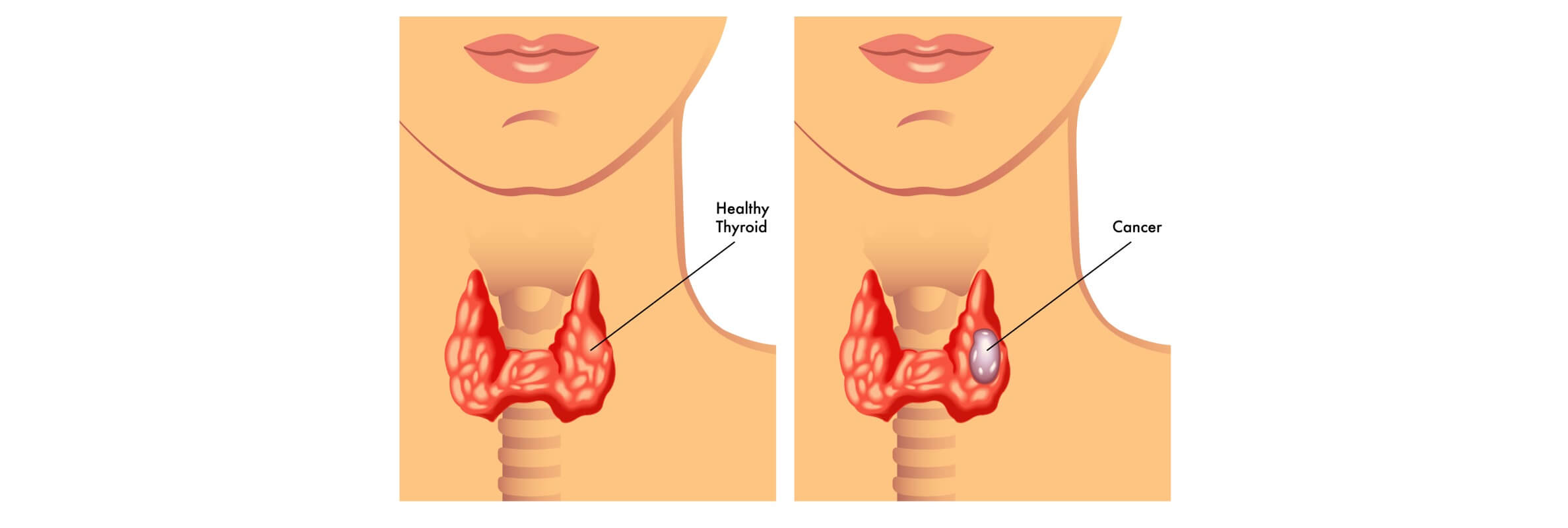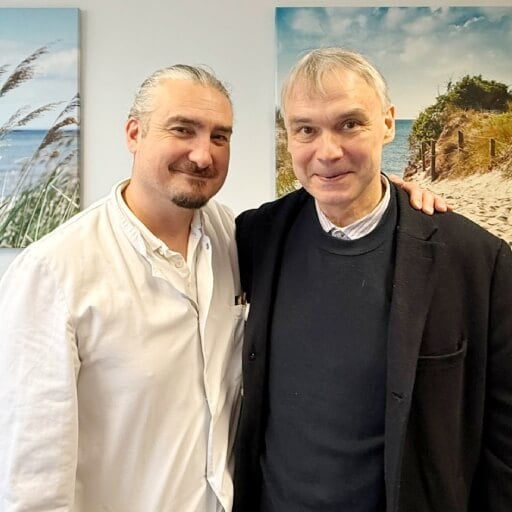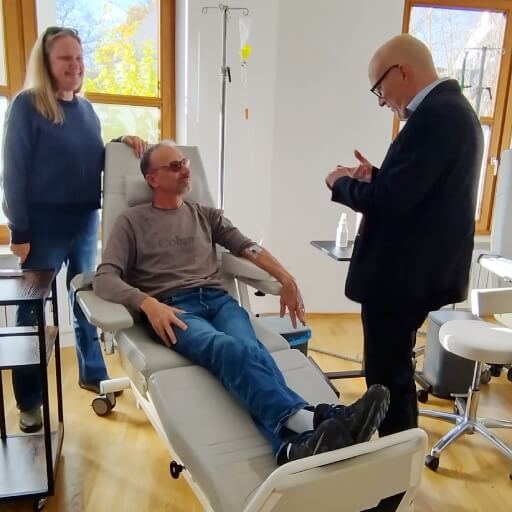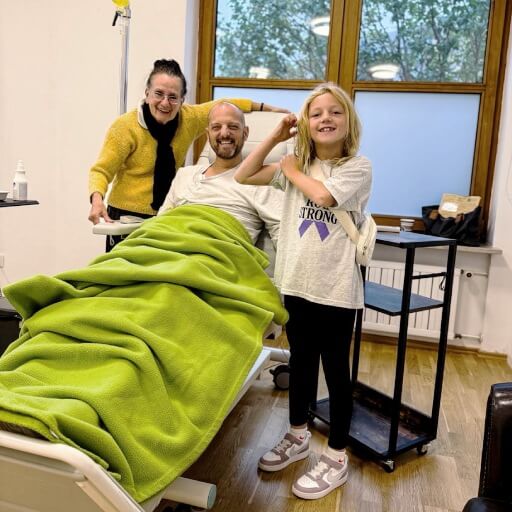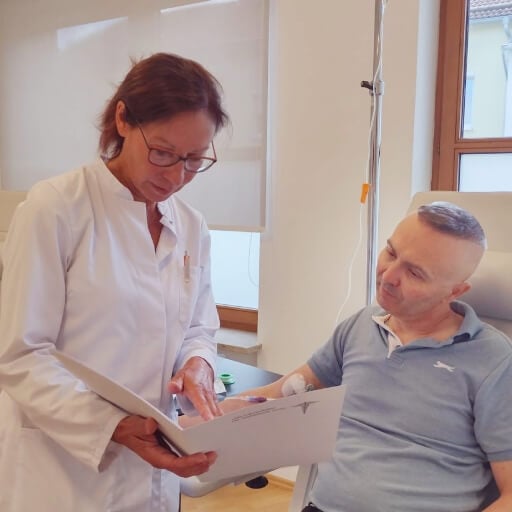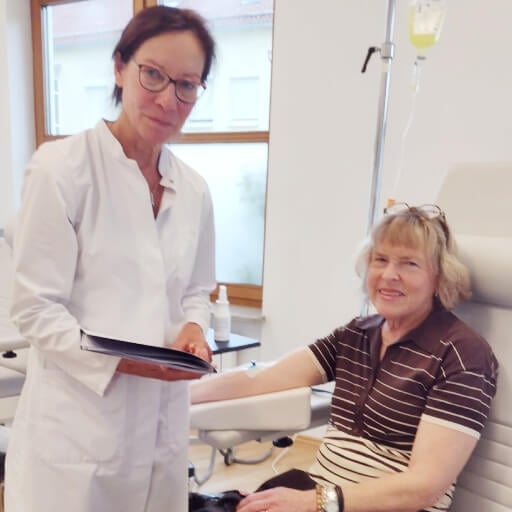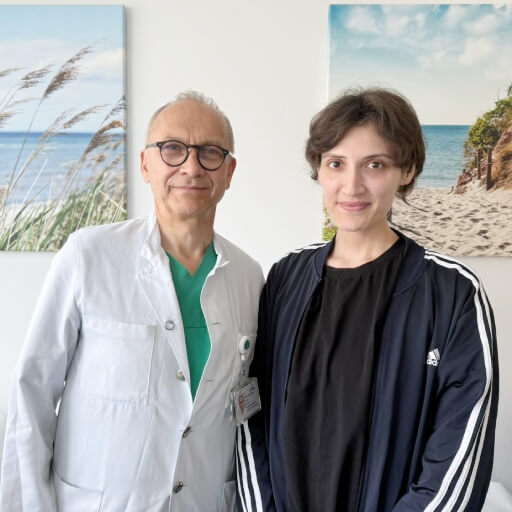Thyroid cancer is one of the most rapidly growing endocrine malignancies worldwide. In Europe, the annual incidence reaches 8.3 cases per 100,000 population, while the mortality remains relatively low at 0.33 per 100,000 [1]. This situation reflects the effectiveness of modern diagnostic tools and treatment options, as well as the generally favorable prognosis when patients receive timely medical care.
Germany is among the leading countries in Europe for the management of thyroid cancer, offering advanced surgical techniques, radioiodine therapy, targeted treatments, and comprehensive follow-up programs. Patients benefit from innovative infrastructure, interdisciplinary teams, and treatment protocols that align with international guidelines.

Understanding Thyroid Cancer
Before considering thyroid cancer treatment in Germany, it is essential to understand the main aspects of the disease. Knowing the thyroid cancer risk factors, the biological types of thyroid cancer, and how specialists classify thyroid cancer stages helps patients navigate their diagnosis and treatment options more confidently.
Risk Factors and Causes of Thyroid Cancer
The development of thyroid cancer is influenced by both genetic predisposition and lifestyle. Experts divide risk factors into modifiable and non-modifiable groups:
- Modifiable factors: obesity, smoking (including secondhand smoke), excessive alcohol intake, lack of physical activity, and exposure to high doses of radiation. Managing these aspects may lower the likelihood of disease development.
- Non-modifiable factors: being female, certain inherited mutations or genetic syndromes, and the presence of benign thyroid conditions such as nodules or goiter.
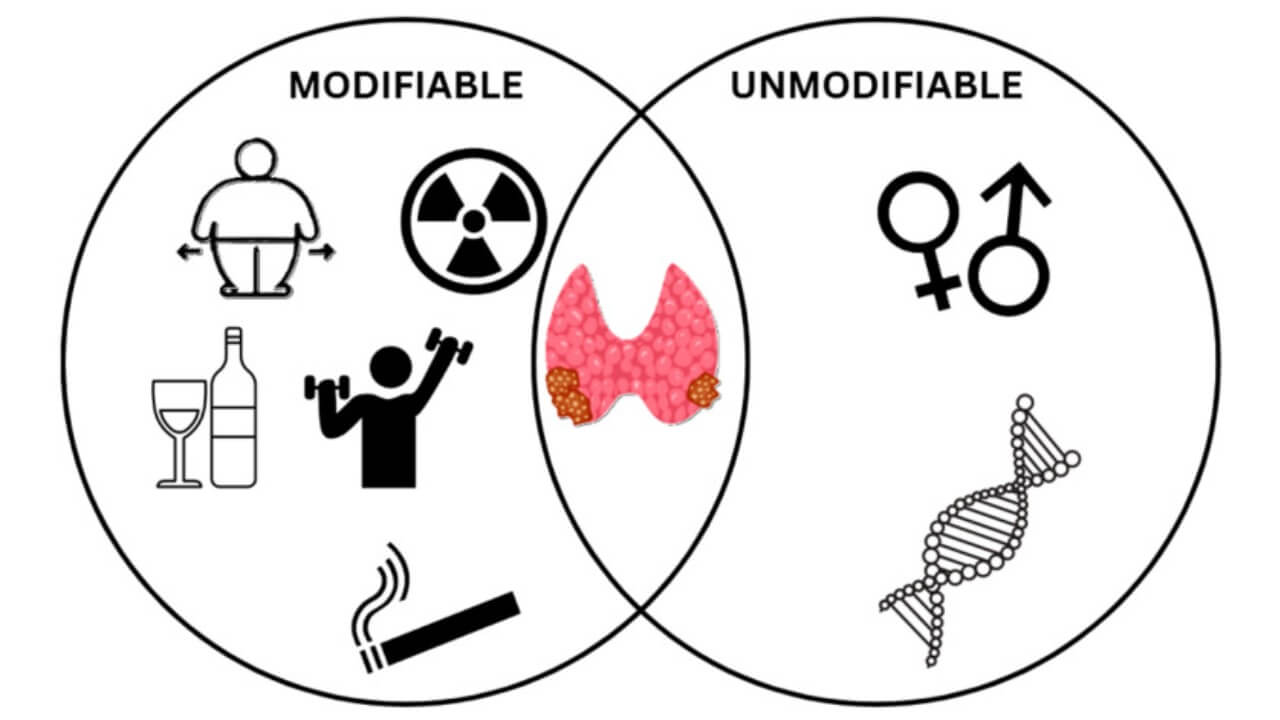
Types of Thyroid Cancer
There are several types of thyroid cancer, each with different biological behavior and prognosis:
- Papillary carcinoma – the most common type of thyroid cancer, typically slow-growing with excellent survival rates
- Follicular carcinoma – may spread through the bloodstream and sometimes requires more aggressive treatment
- Medullary carcinoma – linked to the C-cells of the thyroid and often associated with genetic syndromes
- Anaplastic carcinoma – rare but one of the most aggressive thyroid cancers, usually diagnosed in advanced stages
Thyroid Cancer Stages
Understanding thyroid cancer stages is crucial in planning therapy.
- Stage I–II: the tumor is limited to the thyroid gland and carries a highly favorable prognosis
- Stage III: the disease extends into nearby tissues or lymph nodes
- Stage IV: advanced thyroid cancer with local invasion or distant metastases, requiring complex multimodal therapy
By carefully assessing risk factors, the exact type of thyroid cancers, and their stage, doctors in Germany can design highly personalized treatment strategies, ensuring the best possible outcomes for international patients.
Diagnostic Methods of Thyroid Cancer in Germany
Accurate diagnosis is the first step toward effective thyroid cancer treatment in Germany. Doctors rely on a combination of modern imaging and laboratory techniques to confirm the disease, define its type, and plan the most appropriate therapy.
- Ultrasound examination – the primary tool for detecting nodules, measuring their size, and identifying suspicious features
- Fine-needle aspiration biopsy (FNAB) – provides tissue samples for microscopic analysis to confirm malignancy
- Blood tests – help evaluate thyroid function and measure tumor markers such as calcitonin or thyroglobulin
- Scintigraphy – shows whether a thyroid nodule is "hot" (producing hormones) or "cold" (inactive, possibly malignant)
- CT, MRI, or PET-CT – used to assess the extent of the disease and detect possible metastases
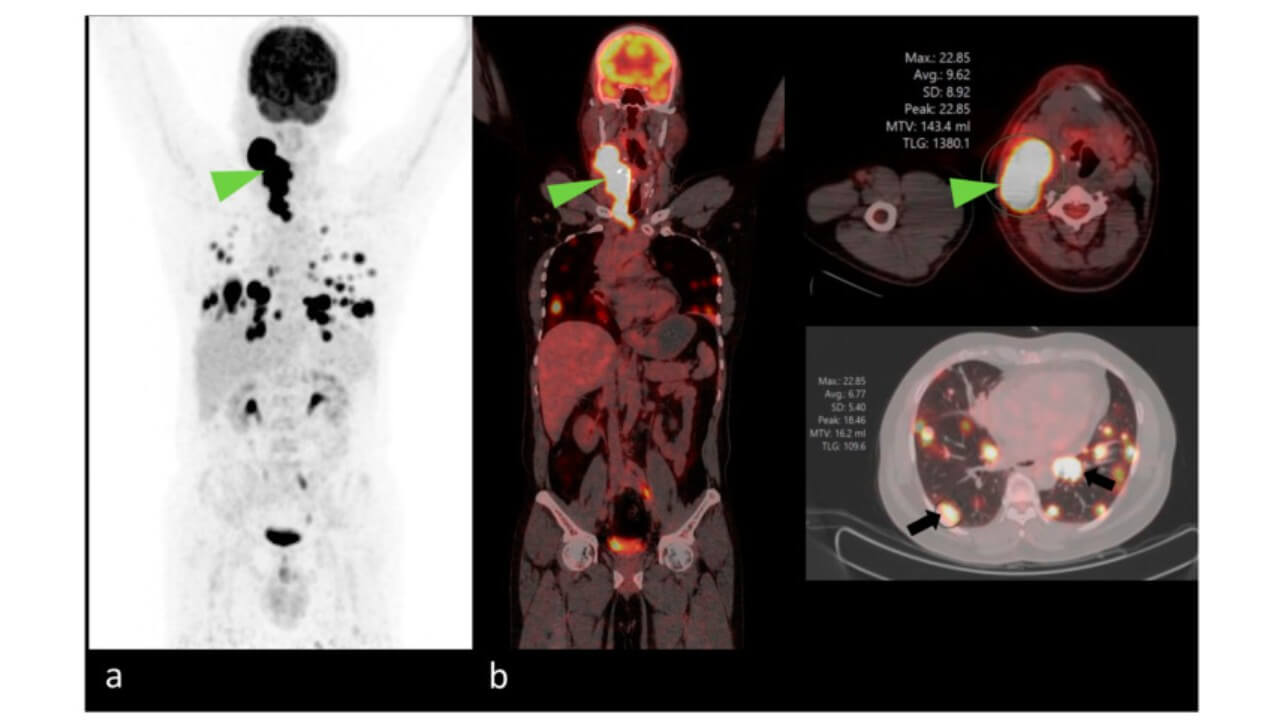
This step-by-step diagnostic approach ensures that each patient receives a precise evaluation, which is the foundation for successful thyroid cancer treatment in Germany.
Thyroid Cancer Treatment Options
Once an accurate diagnosis is established, during the appointment, doctors can select the most effective treatment of thyroid cancer. German clinics are known for their precision and advanced methods, combining surgery, radioiodine therapy, and modern systemic treatments. The choice depends on the tumor type, its stage, and whether the cancer has spread beyond the thyroid gland.
Surgery – A Cornerstone of Thyroid Cancer Treatment
Surgery is the primary approach in most cases. A thyroidectomy (removal of the entire thyroid gland) is performed when the tumor is larger, aggressive, or involves both lobes. In selected cases, a lobectomy may be sufficient.
In Germany, surgeons are increasingly using minimally invasive techniques, which require smaller incisions and result in less pain, a faster recovery, and better cosmetic outcomes. These methods allow precise removal of the tumor while protecting nearby structures, including the vocal cords and parathyroid glands.
After thyroidectomy, patients usually require lifelong thyroid hormone therapy, which compensates for the loss of the natural gland and helps prevent the growth of any remaining cancer cells.
For a succinct, expert overview of endocrine surgical management and its clinical context in Germany - emphasizing surgical scope, institutional experience, and procedural insight - watch interview with Professor Fendrich.
Radioactive Iodine Therapy for Thyroid Cancer
Radioiodine therapy is one of the most distinctive and effective treatments for thyroid cancer, especially for papillary and follicular types. Because only the thyroid gland naturally absorbs iodine, radioactive iodine (I-131) can be given orally in capsule or liquid form, delivering highly targeted radiation directly to thyroid cells while sparing the rest of the body.
Radiation destroys microscopic cancer remnants after surgery, reduces recurrence risk, and is also effective when the disease has spread to lymph nodes or distant organs. In German clinics, radioiodine therapy is performed in specialized nuclear medicine units under strict safety standards. Patients are monitored closely, and the exact dose of radiation is carefully calculated for maximum effect with minimal side effects.
Immunotherapy and Targeted Treatments for Thyroid Cancer
When thyroid cancer becomes advanced or no longer responds to surgery and radioiodine, German clinics may consider innovative systemic approaches. These are typically applied in specialized centers and involve therapies that either block cancer growth signals or stimulate the patient’s own immune system.
- Tyrosine kinase inhibitors (TKIs): These agents block signaling pathways that tumors rely on for growth and blood vessel formation. By interrupting these processes, TKIs can slow or stabilize the disease.
- PD-1 inhibitors: This form of therapy enhances the immune system by preventing cancer cells from evading detection. Once released from this "brake", immune cells are better able to attack and destroy malignant thyroid cells.
- Dendritic cell therapy: An advanced immunotherapy approach using the patient’s own immune cells. Dendritic cells are collected, activated in the lab, and reintroduced to help the body recognize thyroid cancer cells. The approach is based on work that was recognized with a Nobel Prize, and it is increasingly offered in German cancer centers for complex cases [5].
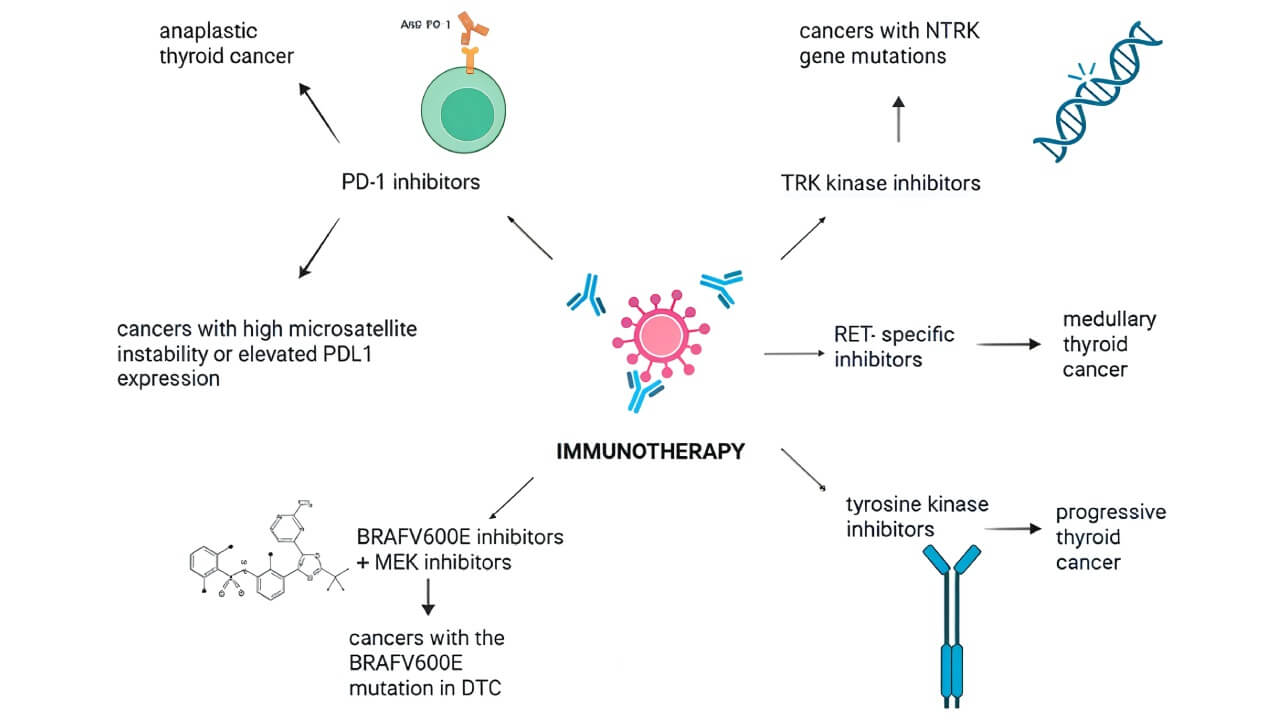
These options are generally reserved for complex cases and are integrated into a personalized treatment of thyroid cancer after careful diagnosis and evaluation by a multidisciplinary team.
| Therapy Type | 2-Year Survival Rate | Response Rate | Duration | Side Effects |
|---|---|---|---|---|
| Standard Treatments | ~55-70% for early stages ~30% for advanced stages | ~40-60% | Several weeks to months | Moderate to severe (fatigue, nausea, infertility, bowel/bladder issues) |
| Innovative Methods | ~60-75% in select advanced/refractory cases | 45-65% | Multiple sessions are possible | Mild (fever, localized inflammation, flu-like symptoms) |
*Based on Booking Health clinical data and published outcomes. Actual results may vary depending on patient condition and treatment protocol.
Why Choose Germany for Thyroid Cancer Treatment?
For many years, Germany has been recognized for its outstanding healthcare. This reputation attracts people from all over the world who need reliable cancer treatment in Germany. In German medical centers, patients receive care that combines the latest technologies with the expertise of highly trained specialists. Importantly, support is continuous: from the first diagnosis through treatment and later recovery.
International patients often rely on Booking Health to simplify the process. The service helps with arranging appointments, handling medical records, and organizing the trip itself. This practical assistance allows people to concentrate on what matters most—their health.
German Healthcare System
The German healthcare system has a reputation for safety, clear rules, and high-quality standards. Every hospital follows evidence-based protocols, meaning that tests and treatment decisions are always backed by proven medical science rather than guesswork.
An important advantage is early detection. German clinics invest heavily in modern diagnostics that can reveal the spread of thyroid cancer before it becomes advanced. When cancer is caught at an early stage, doctors can create a plan that fits the situation much more precisely. Imaging scans, laboratory analysis, and specialized procedures are all carried out by trained professionals.
Expert Surgeons and Multidisciplinary Care
German surgeons are respected worldwide for their accuracy in both conventional and minimally invasive operations. But surgery is rarely performed in isolation. Endocrinologists, oncologists, radiologists, and nuclear medicine doctors usually work together, forming a multidisciplinary team. This cooperation ensures that every aspect of the disease and each patient’s medical background is taken into account.
With Booking Health, patients get access to these teams more easily. The platform arranges consultations, follow-ups, and treatment schedules. In practice, this means therapy is aligned not only with the stage and spread of cancer but also with the patient’s daily life and personal needs.
| Cost of treatment | Standard Methods | Innovative Methods |
|---|---|---|
| Price of Treatment in Germany | €25,000 – €280,000 for a full course | €20,000 – €38,000 for a full course |
| Price of Treatment in the UK | €26,000 – €320,000 for a full course | €25,000 – €45,000 for a full course |
| Price of Treatment in the USA | €100,000 – €350,000 for a full course | €35,000 – €150,000 for a full course |
Best Clinics for Thyroid Cancer Treatment
Germany is considered one of the leading destinations in Europe for the treatment of endocrine malignant tumors. Modern thyroid cancer hospitals in this country combine high-precision diagnostics and surgery, radioiodine therapy, and systemic treatment methods (in accordance with international recommendations). That is why patients from different countries turn to the best hospitals for thyroid cancer treatment in Germany, where therapy is planned individually.
The top thyroid cancer hospitals in Germany include both university clinics and large specialized medical centers – they have many years of experience treating both early-stage disease and complex cases with metastases or resistance to standard therapy. Below are the best thyroid cancer hospitals – trusted by international patients and consistently delivering high clinical results.
Helios Hospital Berlin-Buch
Helios Hospital Berlin-Buch is one of the largest medical centers in Germany. Also, Helios is among the best hospitals for treating thyroid cancer. Treatment is supplemented with radioiodine therapy and modern postoperative monitoring (which reduces the risk of recurrence and preserves the quality of life). The clinic has a powerful endocrine surgery department – here organ-preserving operations and total thyroidectomies are performed using intraoperative neuromonitoring.
Schön Klinik Hamburg Eilbek
Schön Klinik Hamburg Eilbek is known for its interdisciplinary approach and is among the best hospitals for thyroid cancer in northern Germany. The clinic has significant experience in treating differentiated forms of thyroid cancer and complex recurrent cases. Endocrinologists, oncologists, surgeons, and nuclear medicine doctors work closely together – particular attention is paid to accurate preoperative diagnosis and individual selection of the intervention.
University Hospital RWTH Aachen
The RWTH Aachen University Hospital is an example of the best hospitals for treatment of thyroid cancer, where clinical practice is combined with scientific research. Here, innovative surgical techniques, modern radioiodine therapy protocols, and targeted treatment for patients with advanced forms of the disease are implemented. The clinic often accepts patients with complex or atypical clinical situations due to the high level of expertise.
University Hospital Tuebingen
University Hospital Tuebingen belongs to the hospitals specializing in thyroid cancer, where treatment is based on precise risk stratification. Here, patients receive access to modern systemic drugs and careful long-term follow-up after the main stage of therapy. The clinic has a strong school of endocrine oncology and significant experience in the treatment of medullary and radioiodine-refractory cancer.
University Hospital Rechts der Isar Munich
University Hospital Rechts der Isar in Munich is one of the best hospitals for thyroid cancer treatment, due to its combination of high-tech medicine and a multidisciplinary approach. The clinic is known for complex surgical interventions and systemic treatment of advanced stages. It is one of the leading centers for international patients.
Top Thyroid Cancer Hospitals in Germany
| Hospital | City | Key Strengths |
|---|---|---|
| Helios Hospital Berlin-Buch | Berlin | High-precision thyroid surgery, intraoperative neuromonitoring, and radioiodine therapy |
| Schön Klinik Hamburg Eilbek | Hamburg | Multidisciplinary approach, advanced diagnostics, individualized treatment planning |
| University Hospital RWTH Aachen | Aachen | Innovative treatment protocols, complex and advanced thyroid cancer cases |
| University Hospital Tuebingen | Tuebingen | Expertise in aggressive and radioiodine-refractory thyroid cancer, systemic therapies |
| University Hospital Rechts der Isar Munich | Munich | University-level care, complex surgery |
A Medical Journey: Every Step of the Way With Booking Health
Finding the best treatment strategy for your clinical situation is a challenging task. Being already exhausted from multiple treatment sessions, having consulted numerous specialists, and having tried various therapeutic interventions, you may be lost in all the information given by the doctors. In such a situation, it is easy to choose a first-hand option or to follow standardized therapeutic protocols with a long list of adverse effects instead of selecting highly specialized innovative treatment options.
To make an informed choice and get a personalized cancer management plan, which will be tailored to your specific clinical situation, consult medical experts at Booking Health. Being at the forefront of offering the latest medical innovations for already 12 years, Booking Health possesses solid expertise in creating complex management programs in each individual case. As a reputable company, Booking Health offers personalized thyroid cancer treatment plans with direct clinic booking and full support at every stage, from organizational processes to assistance during treatment. We provide:
- Assessment and analysis of medical reports
- Development of the medical care program
- Selection of a suitable treatment location
- Preparation of medical documents and forwarding to a suitable clinic
- Preparatory consultations with clinicians for the development of medical care programs
- Expert advice during the hospital stay
- Follow-up care after the patient returns to their native country after completing the medical care program
- Taking care of formalities as part of the preparation for the medical care program
- Coordination and organization of the patient's stay in a foreign country
- Assistance with visas and tickets
- A personal coordinator and interpreter with 24/7 support
- Transparent budgeting with no hidden costs
Health is an invaluable aspect of our lives. Delegating management of something so fragile yet precious should be done only to experts with proven experience and a reputation. Booking Health is a trustworthy partner who assists you in pursuing stronger health and a better quality of life. Contact our medical consultant to learn more about the possibilities of personalized treatment with innovative methods for thyroid cancer with leading specialists in this field.
Advanced Cancer Treatment: Patient Success Stories with Booking Health
Frequently asked Questions of Our Patients About Thyroid Cancer Treatment
Send request for treatmentGermany offers comprehensive thyroid cancer treatment, including thyroidectomy, radioactive iodine therapy, targeted therapy, and non-surgical methods like radiofrequency ablation. Multidisciplinary teams provide expert oncology care and postoperative monitoring, ensuring personalized care for each patient.
The cost of thyroidectomy in Germany varies by hospital and complexity. Transparent medical tourism pricing allows international patients to plan their finances. Booking Health services help coordinate pricing details, hospital selection, and postoperative monitoring for a smooth treatment experience.
Yes, leading German centers provide radioactive iodine therapy with advanced nuclear medicine units. It’s effective for residual cancer and metastatic disease, combined with thyroidectomy or targeted therapy, with full international patient care support.
Absolutely. International patient care includes expert oncology care, transparent medical tourism pricing, and support with visas, language, and Booking Health services. Top German centers follow strict safety protocols and offer postoperative monitoring for optimal outcomes.
The best thyroid hospitals in Germany and top clinics for thyroid cancer are university centers and specialized endocrine surgery departments. They focus on precise diagnosis, minimally invasive procedures, and safe thyroidectomy. Many also offer radioactive iodine therapy, targeted drugs, and modern approaches to complex thyroid nodules.
Yes, German centers provide advanced nodule treatment with non-surgical methods like radiofrequency ablation, in addition to thyroidectomy when needed. Expert oncology care ensures safety, with postoperative monitoring and full Booking Health services support for international patients.
The main symptoms include a lump or swelling in the neck, hoarseness, difficulty swallowing, pain or a feeling of pressure in the throat. In some cases coughing, shortness of breath or bone pain with metastases may occur.
In Germany, a full course of standard treatment costs between $25,000 and $280,000 and innovative methods cost between $20,000 and $38,000. In the UK, prices range from $26,000 to $320,000 and in the USA, from $100,000 to $350,000. In Australia, access to the latest methods is limited and the overall cost is usually higher than in Germany.
Standard treatments show a 2-year survival rate of about 55–70% for early-stage disease and about 30% for advanced disease. Response rates are 40–60%.
Innovative treatments, such as targeted therapy and dendritic cell immunotherapy, show improved 2-year survival rates of 60–75% and response rates of 45–65%, even in difficult or refractory cases.
Standard treatments usually last a few weeks or months. Innovative treatments are given in multiple sessions that can be repeated, providing longer-term control of the disease.
Standard treatments may cause nausea, fatigue and bowel or bladder problems. Innovative methods usually cause only mild reactions一short-term fever, local inflammation or flu-like symptoms.
The main ones are surgery (thyroidectomy or lobectomy), radioiodine therapy, targeted therapy, immunotherapy (including dendritic cell therapy), and, in difficult cases, chemotherapy. Treatment is selected individually depending on the type and stage of the disease.
Thyroid cancer treatment is based on tumor histology, stage and radioiodine sensitivity. Standard care includes surgery and RAI; advanced or refractory disease may require targeted therapy, immunotherapy or regional chemotherapy (within specialized oncology programs).
The best hospitals for thyroid cancer are high-volume endocrine oncology centers Such centers can adapt treatment, when standard RAI therapy loses effectiveness.
Choose treatment abroad and you will be sure to get the best results!
Authors:
This article was edited by medical experts, board-certified doctors Dr. Nadezhda Ivanisova, and Dr. Bohdan Mykhalniuk. For the treatment of the conditions referred to in the article, you must consult a doctor; the information in the article is not intended for self-medication!
Our editorial policy, which details our commitment to accuracy and transparency, is available here. Click this link to review our policies.
Sources:
[1] Jessica B Shank, Chandrakanth Are, Chelsea D Wenos. Thyroid Cancer: Global Burden and Trends. Indian J Surg Oncol. 2022 Mar;13(1):40-45. doi: 10.1007/s13193-021-01429-y. Epub 2021 Sep 4. [DOI] [PubMed]
[2] Gabriella Pellegriti, Francesco Frasca, Concetto Regalbuto et al. Worldwide increasing incidence of thyroid cancer: update on epidemiology and risk factors. J Cancer Epidemiol. 2013:2013:965212. doi: 10.1155/2013/965212. Epub 2013 May 7. [DOI] [PubMed]
[3] Alicja Forma, Karolina Kłodnicka, Weronika Pająk et al. Thyroid Cancer: Epidemiology, Classification, Risk Factors, Diagnostic and Prognostic Markers, and Current Treatment Strategies. Int J Mol Sci. 2025 May 28;26(11):5173. doi: 10.3390/ijms26115173. [DOI] [PubMed]
[4] Nivedita Chakrabarty, Abhishek Mahajan, Sandip Basu, Anil K D'Cruz. Comprehensive Review of the Imaging Recommendations for Diagnosis, Staging, and Management of Thyroid Carcinoma. J Clin Med. 2024 May 14;13(10):2904. doi: 10.3390/jcm13102904. [DOI] [PubMed]
[5] Nobel Prize. The Nobel Prize in Physiology or Medicine 2011 – Ralph Steinman. https://www.nobelprize.org/prizes/medicine/2011/steinman/facts/
Read:
New Effective Treatments for Stage 4 Cancer: Innovations in Oncology
Treatment of stage 4 thyroid cancer in Germany
Top 10 Leading Oncology Hospitals for Cancer Treatment in Germany
Article menu:
- Understanding Thyroid Cancer
- Diagnostic Methods of Thyroid Cancer in Germany
- Thyroid Cancer Treatment Options
- Why Choose Germany for Thyroid Cancer Treatment?
- Best Clinics for Thyroid Cancer Treatment
- A Medical Journey: Every Step of the Way With Booking Health
- Frequently asked Questions of Our Patients About Thyroid Cancer Treatment
Don't know where to start?
Contact Booking Health